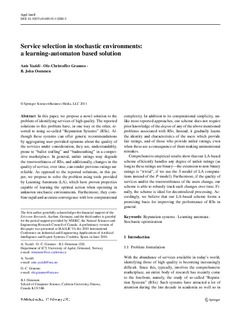| dc.description.abstract | In this paper, we propose a novel solution to the problem of identifying services of high quality. The reported solutions to this problem have, in one way or the other, resorted to using so-called “Reputation Systems” (RSs). Although these systems can offer generic recommendations by aggregating user-provided opinions about the quality of the services under consideration, they are, understandably, prone to “ballot stuffing” and “badmouthing” in a competitive marketplace. In general, unfair ratings may degrade the trustworthiness of RSs, and additionally, changes in the quality of service, over time, can render previous ratings unreliable. As opposed to the reported solutions, in this paper, we propose to solve the problem using tools provided by Learning Automata (LA), which have proven properties capable of learning the optimal action when operating in unknown stochastic environments. Furthermore, they combine rapid and accurate convergence with low computational complexity. In addition to its computational simplicity, unlike most reported approaches, our scheme does not require prior knowledge of the degree of any of the above mentioned problems associated with RSs. Instead, it gradually learns the identity and characteristics of the users which provide fair ratings, and of those who provide unfair ratings, even when these are a consequence of them making unintentional mistakes. Comprehensive empirical results show that our LA-based scheme efficiently handles any degree of unfair ratings (as long as these ratings are binary—the extension to non-binary ratings is “trivial”, if we use the S -model of LA computations instead of the P -model). Furthermore, if the quality of services and/or the trustworthiness of the users change, our scheme is able to robustly track such changes over time. Finally, the scheme is ideal for decentralized processing. Accordingly, we believe that our LA-based scheme forms a promising basis for improving the performance of RSs in general. | no_NO |
